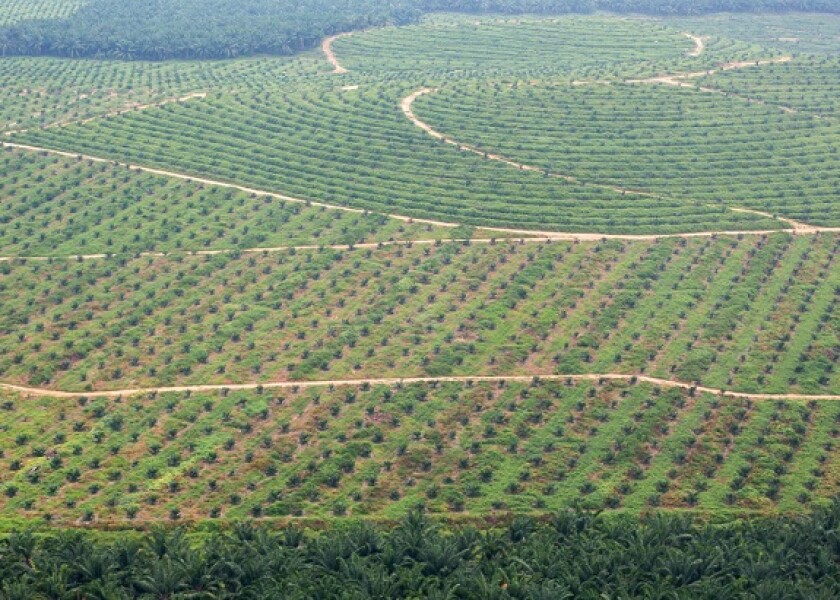The progressive destruction of the world’s forests is one of the worst causes of climate change, but receives far less attention in financial markets than the industrial and energy sectors. Thirty investors formed a new coalition on Tuesday to force forests up the markets’ agenda, by tackling head on companies in the agricultural supply chains that cause most deforestation. But the hard part will be implementation — and securing further support from investors and banks.
The group, which includes Aviva, Axa, Scor and Legal & General, have signed a joint Commitment on Eliminating Agricultural Commodity-Driven Deforestation from their portfolios by 2025.
It was announced at COP26 alongside the Glasgow Leaders’ Declaration on Forests and Land Use, in which the governments of 105 countries have promised to eradicate deforestation by 2030.
That may be too slow a timescale to save fragile environments like the Amazon rainforest (see separate story).
A committed few capital markets investors are well aware of these dangers, and their numbers are growing. Storebrand and BlueBay have since June 2020 been leading a group called the Investors’ Policy Dialogue on Deforestation, which engages, as bond investors, with the governments of first Brazil and then also Indonesia, urging them to do more to protect their rainforests.
Their work has shown them that international agreements and political decisions make a huge difference.
Into reverse
“Brazil was an early success story,” said Vemund Olsen, senior sustainability analyst at Storebrand in Lysaker, Norway. “They reduced deforestation by 70% to 80% between about 2007 and 2012. But then because of changing political priorities, a lot of the success was squandered.”
Jair Bolsonaro, who became Brazil’s president at the beginning of 2019, has cut budgets for protecting the Amazon, scorned indigenous people’s rights and weakened legal protections, leading to a sharp rise in tree felling and deliberate burning of the forest.
In Indonesia, the pendulum has been swinging in the right direction since Joko Widodo was elected in 2014, but it could swing back again.
Getting specific
What is less clear is how much power investors have to influence the fate of forests. Campaigners have highlighted how large institutions such as BlackRock, Vanguard, JP Morgan, Citigroup and Bank of America finance activities in the Amazon that contribute to harming or threatening indigenous people’s lands and livelihoods, as well as the environmental integrity of the forests.
This implies if big financial firms divested, or put more pressure on companies damaging forests, improvements might be achievable.
The new investor initiative announced on Tuesday aims to do just that. Thirty institutions with total assets under management of $8.7tr have jointly committed to ridding themselves of deforestation driven by production of agricultural commodities, specifically cattle, palm oil, soy, wood pulp and paper.
“Some investors have been working very actively on deforestation for a number of years,” said Olsen. “The novelty here is that this is a commitment to set a very specific target for 2025, of having deforestation-free portfolios.”
Members include ethically focused asset managers such as Boston Common, Impax, Generation and the Church Commissioners for England, but also large, general institutions like Schroders, Fidelity International, the international business of Federated Hermes, and Sumitomo Mitsui Trust.
The group came together in response to a call for such a campaign from Gonzalo Muñoz and Nigel Topping, the High Level Climate Champions who have been stirring up action in financial markets ahead of COP26.
The Principles for Responsible Investment, which already has investor working groups on commodity risks, is helping co-ordinate the group.
However, many of the very biggest investors are not members, including BlackRock, Vanguard, State Street and Amundi.
Asked about that, Olsen said: “The initiative was remarkably quickly put together — we were mobilising with investors already aware of this risk. I think more investors will be able to join.”
Whodunnit?
Storebrand had already in 2019 adopted a no deforestation policy with a target of 2025, and hopes that with more investors backing the campaign, it will have more chance of success.
Deforestation is a much more difficult problem to tackle than some other ESG issues, because of the wide, often remote areas where it can occur, and the complexity and informality of supply chains, which make it difficult to know where products come from.
“It’s not that hard to monitor trees being cut down — the technology is available with satellite imaging,” said Olsen. “The challenge is to identify who owns the land and who they are selling to.”
There have been some successes. “Deforestation from palm oil is going down,” said Olsen.
Governments such as Indonesia and Malaysia have made efforts; pressure from food companies and financial institutions, spurred by public protests, may also have made a difference. Many banks now have policies on financing only sustainable palm oil.
But this is one of the easier kinds of damage to address. “Sixty percent of palm oil plantations are controlled by big companies,” said Olsen. “They may or may not be listed, but you know which companies own which plantation.”
Palm oil plantations are easy to spot and immobile.
Moving target
The same is not true of cattle raised on deforested land in the Amazon, especially in Brazil.
The $500m ‘sustainable transition’ bond issued by Marfrig, the Brazilian meat packer, in 2019 highlighted how, although the company has policies to limit its purchases of beef reared on deforested land, it cannot really be sure that it is not doing so.
Soy, the other big crop causing deforestation in south America, also has a very obscure supply chain.
“The big commodity trading firms, like Bunge, Archer Daniels Midland and Cargill, source from thousands of small or large scale producers, and they are not transparent about who they source from,” said Olsen. “They claim it is commercially sensitive. That makes it challenging to trace what they are selling to where it was produced.”
Storebrand backed a motion at Bunge’s annual general meeting in May, calling on it to improve its efforts to combat deforestation. A heavy majority of shareholders supported it.
Another obstacle to rooting out deforestation is that so many companies are affected. “These commodities are part of so many supply chains,” said Olsen. “Food, animal feed for salmon producers, clothing, cosmetics — even the car seats of European car makers are frequently made of leather from cows in Brazil with a high deforestation risk.”
Unlike oil from tar sands or the Arctic, the commodities themselves are not the problem, he argued, “so divesting on a product basis is not really the issue”.
Open up
The group’s emphasis is heavily on engagement, rather than divestment. Its goal is that these agricultural commodities can be produced sustainably, supporting local people, rather than through deforestation. But divestment remains an option if companies fail to improve.
“We want to make a change in sourcing patterns,” Olsen said. “We want companies to be more transparent about who they are sourcing from, and to make sure that suppliers are deforestation-free in all their activities, not just the commodities sold to consumers in Europe.”
The first task for investors is to screen all their investments for deforestation risk and map where it lies. Storebrand repeats this process every year.
It has developed its own methodology to work out which companies to focus on, using two databases. The Forest 500 list compiled by Global Canopy identifies companies involved in forest risk supply chains, including financial firms. It charts whether they have policies on deforestation, how strong these are, and how well they report on their actions.
The second tool is Trase, a free service that combines trade data from companies with customs, shipping, tax, logistics and other information to map agricultural supply chains and who invests in them. Sometimes Trase can identify the municipal area where goods have come from.
“It enables us to find some of the middle players and identify their share of deforestation,” said Olsen.
Banks needed
Using this analysis, Storebrand has identified a target list of 50 companies. Some have the worst policies — Storebrand is asking them to improve to best practice; others have a policy, but have not yet shown any substantial improvement in performance.
The asset manager has begun writing to them — some have entered into dialogue; others have not responded.
Most are companies it owns equity in, but it has not ruled out engaging with unlisted companies such as Cargill, if it holds their bonds.
Whether investors can achieve real gains on their own remains to be seen. The strength of government action is likely to be crucial.
Olsen is encouraged by signs that the UK, EU and US may tighten regulation on forest risk commodities, and by the Forest Declaration announced on Tuesday.
But if investors’ power is fairly weak so far, the way to strengthen it is by gathering more support.
“Banks and finance are really important,” Olsen said. “While many of the initial producers of commodities may not be listed, banks provide them with loans — so we want banks to introduce much stronger criteria.”
Banks in Brazil had recently begun “really waking up” to this issue, he said.
Asked whether he thought banks should join the investor Commitment on deforestation, the head of sustainability at a major European bank said: “Agreed — we need to come there too. This was all very hasty — we need to have time to check these things. Signing things is self-evident but we need to be able to measure things. We got it 20 days before this event and there was a lot of pressure prior to COP26 — there’s a limit to what you can sign. But my ambition is certainly that we will sign it.”
Goliaths move
So are some of the agricultural companies. The 10 largest in the world, including ADM, Bunge, Cargill, Olam, Wilmar and JBS, which between them handle more than half of Brazilian soy exports and the global palm oil trade, issued their own joint Corporate Statement of Purpose at COP26 on Tuesday, after a meeting convened by US climate envoy John Kerry and UK secretary of state for business Kwasi Kwarteng in October.
They committed to “accelerate sector-wide action and to identify opportunities for public-private collaboration to catalyse further progress on eliminating commodity-driven deforestation”.
Little has been decided yet — most of the statement was individual summaries from each company of its own commitments, such as Brazilian meat group JBS’s target to reach net zero emissions by 2040. It says it is using blockchain technology to monitor its indirect suppliers, and will stop buying from companies not on this system in 2025.
But the companies said that by COP27 next year, they would “lay out a shared roadmap for enhanced supply chain action consistent with a 1.5°C pathway, that … increases collaboration and implementation in areas including: enabling policy environments, transparency on Scope 3 emissions and indirect supply chains, and improving livelihoods for farmers.”
If these industry leaders can genuinely fulfil the spirit of their own high-sounding environmental and social commitments, it will be a big advance.
But as Olsen pointed out: “Even companies that do their utmost may still be at financial risk from deforestation by other actors. We need to ensure there aren’t free riders, producing commodities at lower prices through deforestation.”





